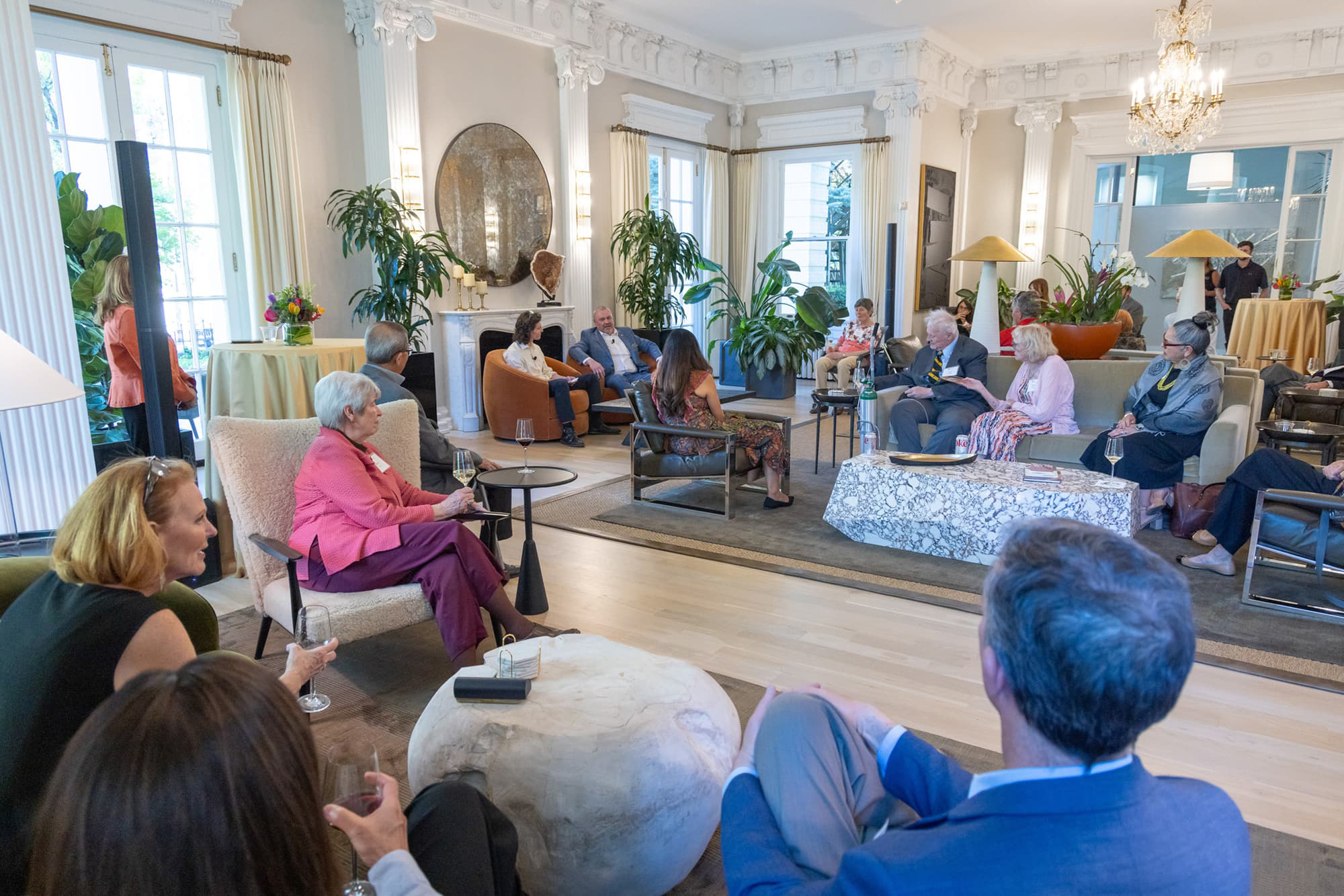Articulating a Commitment to Student Success
Chancellor Christensen shares his impressions of CU Denver and focuses on the opportunities ahead.
Jun 9, 2025
A few days after addressing more than 2,000 new graduates at CU Denver’s Spring Commencement, CU Denver Chancellor Kenneth T. Christensen, PhD sat down with Film and Television student Jamie Chenhall and a more intimate audience to share his impressions since joining the university in February. The occasion provided Chancellor Christensen a chance to reflect on his first few months on the job and offer his thoughts about CU Denver’s opportunities and future priorities.
The setting for this “fireside chat” on May 20 was the living room of the historic Crawford Hill Mansion, which is now the home of the Salazar Family Foundation. From the grand staircase in the main foyer, Lola Salazar MA ’92 (pictured below with Jamie Chenhall and Chancellor Christensen), the foundation’s president and founder, welcomed a small group of CU Denver supporters, alumni, faculty, and staff, and invited them to gather in the living room of this newly restored Denver landmark where Christensen and Chenhall held their conversation.

Uniquely Positioned for Success
Chancellor Christensen made one thing clear from the start: his path to leadership has always been grounded in a deep personal commitment to educational opportunity. “I was raised in a family of teachers,” he said. “I’ve always believed that education is a force for good—something that should uplift individuals, families, and entire communities.”
That belief drew him to CU Denver. He was inspired by the university’s mission to serve first-generation students and to open doors wider for those often left out of traditional higher education pathways. “Every student deserves a legitimate opportunity to succeed,” he said. “CU Denver is uniquely positioned to provide that.” This view is backed by compelling data. CU Denver is Colorado’s only public university that ranks as both highly accessible and a top performer in financial return, according to the Carnegie Student Access and Earnings Classification and the Georgetown University Center on Education and the Workforce. This means that on average those who graduate from our campus will benefit from more than $2 million in lifetime earnings.
Ensuring our students reach graduation is top of mind for Christensen, whose academic background is rooted in the sciences, and engineering in particular. When Chenhall asked what innovation looked like to him, Christensen framed his reply around student success. “Innovation in higher education isn’t just about technology or research breakthroughs,” he noted. “It’s about evolving the way we support our students.” He pointed to a recent assessment by the National Institute for Student Success that provided our campus hard data highlighting the university’s challenges and opportunities. Among these are initiatives that will create smoother pathways to graduation, such as standardizing and personalizing academic advising, focusing on the first-year experience, and leveraging data to remove barriers that may arise in pursuit of a degree. Addressing these and other opportunities campus-wide, the university aims to create a more coherent and supportive student journey.
Christensen mentioned several initiatives that have already had a positive influence on student success, including the Lola & Rob Salazar Student Wellness Center, the First-Generation and Multicultural Business Program, and the Learning Assistants Program in the College of Liberal Arts and Sciences. Initiatives like these, he remarked, exemplify CU Denver’s commitment to a holistic approach to higher education, which he would like to see broadened and made equitable throughout the campus.

A Partner for the Community
Beyond helping students reach the finish line, the chancellor emphasized the university’s responsibility to create effective pathways for graduating students to launch their careers. This, he said, requires an extensive network of partnerships through the community, be it with industry, government, or nonprofit organizations. These partnerships are vital for experiential learning, such as internships and research opportunities, and they help inform the academic curriculum to ensure CU Denver students hit the ground running when they enter the workforce. “We have an opportunity to build on CU Denver’s excellence,” Christensen said. “To align our programs with the evolving job market, and to create real pipelines from classroom to career.”
The chancellor also emphasized that the university’s relationship with the community is mutually beneficial. As an anchor institution in the heart of downtown, CU Denver plays a vital role in preparing the region’s workforce, addressing civic challenges, and driving inclusive prosperity. “Our success,” he said, “is inseparable from the success of our city.”
CU Denver remains grateful to Lola Salazar and the Salazar Family Foundation for their support of the university and for partnering with us on this event. For more than two decades, the Salazar Family Foundation has dedicated itself to giving back to various organizations that are rooted in educating, inspiring, and fostering connections to the community.
